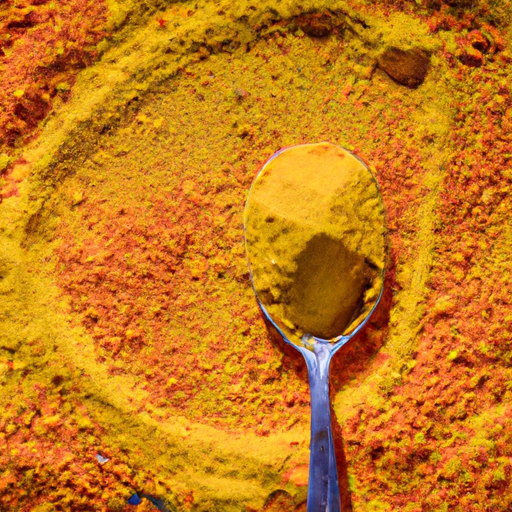Have you ever wondered if there can be too much of a good thing? That’s the question we’re going to explore in this article: can drinking too much turmeric be harmful?
Turmeric has gained immense popularity in recent years for its numerous health benefits. From reducing inflammation to improving brain function, this vibrant yellow spice seems to do it all. But as with any dietary supplement, it’s important to understand the potential risks associated with excessive consumption.
In this article, we will delve into the recommended daily intake of turmeric, the potential side effects of consuming too much, and the interactions it may have with medications. We will also discuss the differences between turmeric supplements and natural sources, and how to find the right balance for safe consumption.
So, let’s dive in and discover how to enjoy the benefits of turmeric without putting our health at risk.
Key Takeaways
- Excessive consumption of turmeric can lead to gastrointestinal issues such as stomach upset and diarrhea.
- Allergic reactions, including skin rashes and swelling, may occur with high intake of turmeric.
- Turmeric may interact with medications, especially blood thinners, so caution should be taken when combining them.
- Bloating, gas, and indigestion can occur with excessive consumption of turmeric, and it may also interfere with iron absorption.
The Health Benefits of Turmeric
Turmeric’s health benefits are numerous, making it a popular choice for those seeking natural remedies. This vibrant yellow spice has been used for centuries in traditional medicine due to its powerful anti-inflammatory and antioxidant properties. Not only is turmeric a staple ingredient in many delicious recipes, but it’s also gaining popularity in skincare products for its potential to improve skin health.
When it comes to turmeric recipes, there are countless options to explore. From flavorful curries to golden milk lattes, this versatile spice can add a unique depth of flavor to your dishes. Additionally, turmeric’s active compound, curcumin, has been shown to have potential health benefits, such as reducing the risk of chronic diseases like heart disease and cancer.
Turmeric is not only beneficial when consumed, but it also has potential benefits for skincare. Some studies suggest that turmeric can help improve skin conditions such as acne, psoriasis, and eczema due to its anti-inflammatory properties. It’s often used in face masks, creams, and serums to promote a healthy and glowing complexion.
As we delve into the recommended daily intake of turmeric, it’s important to understand the potential risks of consuming too much of this spice.
Recommended Daily Intake of Turmeric
To ensure you consume an appropriate amount of turmeric each day, it’s recommended that you follow the recommended daily intake guidelines.
The turmeric dosage can vary depending on various factors such as age, health conditions, and the form of turmeric consumed. For general health benefits, a typical dosage of turmeric powder is around 1 to 3 grams per day. However, it’s important to note that turmeric isn’t easily absorbed by the body. To enhance turmeric absorption, it’s often recommended to consume it with black pepper or fats like oil or coconut milk. This can help increase the bioavailability of the active compound in turmeric, called curcumin.
By following the recommended daily intake guidelines and ensuring optimal absorption, you can maximize the potential health benefits of turmeric.
Now, let’s explore the potential side effects of consuming too much turmeric.
Potential Side Effects of Consuming Too Much Turmeric
Consuming too much turmeric can potentially lead to gastrointestinal issues such as stomach upset, bloating, and diarrhea. These side effects may be more pronounced in individuals with sensitive stomachs or those who consume large amounts of turmeric regularly.
Additionally, some people may experience allergic reactions to turmeric, including skin rashes, itching, and swelling. It’s important to be mindful of the recommended daily intake of turmeric and to consult a healthcare professional if any adverse reactions occur.
Gastrointestinal issues
Excessive intake of turmeric may lead to gastrointestinal problems like stomach upset and indigestion. While turmeric is generally considered safe when consumed in moderation, consuming large amounts can cause digestive problems and discomfort. Some individuals may experience symptoms such as bloating, gas, or diarrhea after consuming too much turmeric. It is important to note that these side effects are usually temporary and can be managed by reducing the amount of turmeric consumed.
To emphasize the potential gastrointestinal issues associated with excessive turmeric intake, consider the following table:
| Potential Gastrointestinal Issues |
|---|
| Stomach Upset |
| Indigestion |
| Bloating |
| Gas |
| Diarrhea |
These symptoms may vary from person to person and may depend on factors such as individual tolerance and the amount of turmeric consumed.
Moving on to the next section about allergic reactions, it is important to be aware of potential sensitivities to turmeric.
Allergic reactions
If you’re not careful, you might experience allergic reactions when using turmeric. While turmeric is generally safe for consumption, some individuals may be allergic to it. Allergic reactions to turmeric can range from mild to severe and may include symptoms such as itching, hives, swelling, and difficulty breathing.
It’s important to be aware of any allergic reactions you may have to turmeric and discontinue its use if you experience any adverse effects. It’s also worth noting that consuming excessive amounts of turmeric can lead to a turmeric overdose, which may exacerbate allergic reactions and cause further health issues. Therefore, it’s crucial to use turmeric in moderation and consult with a healthcare professional if you have any concerns or allergies.
Moving on to the next topic, let’s discuss the potential interactions between turmeric and medications.
Interactions with Medications
Turmeric may potentially have adverse effects when combined with certain medications. It’s important to be aware of potential drug interactions, especially if you’re taking blood thinners. Here are some key points to consider:
-
Turmeric has natural blood thinning properties, which could increase the risk of bleeding when combined with medications like warfarin or aspirin.
-
Turmeric may also interact with antiplatelet drugs, such as clopidogrel, leading to an increased risk of bleeding.
-
Some studies suggest that turmeric could enhance the effects of anticoagulant medications, potentially increasing the risk of bleeding.
-
It’s crucial to consult with your healthcare provider if you’re considering taking turmeric supplements while on blood thinners.
-
Your healthcare provider can provide personalized guidance and help you determine if turmeric is safe for you to take alongside your medications.
Understanding potential drug interactions is essential to ensure your safety and well-being.
Now let’s explore the next section about turmeric supplements versus natural sources.
Turmeric Supplements vs. Natural Sources
To get the most benefit from turmeric, consider incorporating natural sources like fresh turmeric root or adding turmeric powder to your meals rather than relying solely on supplements.
Turmeric supplements can be a convenient option for those who struggle to include turmeric in their diet, but it’s important to understand that the dosage and absorption of turmeric may differ between supplements and natural sources.
When it comes to dosage, turmeric supplements usually contain a standardized amount of curcumin, the active compound in turmeric. However, the dosage may vary among different brands, making it difficult to determine the optimal amount for your needs. On the other hand, when using fresh turmeric root or turmeric powder in cooking, you have more control over the amount you consume.
Additionally, turmeric absorption can be influenced by various factors, such as the presence of fat and the cooking method. Consuming turmeric with a source of fat, like olive oil or coconut milk, can enhance its absorption. Heat can also increase the bioavailability of turmeric, making it more easily absorbed by the body.
In the next section, we will explore the importance of moderation and balance in turmeric consumption, as excessive intake of turmeric can have potential side effects.
Moderation and Balance in Turmeric Consumption
Finding the right balance and consuming turmeric in moderation is key to experiencing its benefits without any potential negative effects.
Turmeric has been used for centuries in traditional medicine for its anti-inflammatory and antioxidant properties. Incorporating turmeric into your diet can be done in various ways. One option is to add it to your cooking, whether it’s in curries, stir-fries, or even smoothies. Another option is to take turmeric supplements, but it’s important to consult with a healthcare professional before starting any new supplement regimen.
When it comes to consuming turmeric, it’s important to remember that moderation is key. While turmeric is generally considered safe, consuming excessive amounts may have some adverse effects. High doses of turmeric can cause gastrointestinal issues such as stomach upset or diarrhea. Additionally, turmeric may interact with certain medications, so it’s important to speak with your doctor if you’re taking any medications.
Incorporating turmeric into your diet can offer numerous health benefits, but it’s important to do so in moderation. By following these tips for incorporating turmeric into your diet and being mindful of potential interactions with medications, you can enjoy the benefits of turmeric safely.
Conclusion: Enjoying the Benefits of Turmeric Safely
Incorporating turmeric into your diet in moderation allows you to enjoy its numerous health benefits while minimizing any potential adverse effects. When it comes to turmeric dosage, it’s important to remember that too much of a good thing can sometimes be harmful.
While turmeric is generally safe for most people when consumed in small amounts as a spice or food ingredient, consuming excessive amounts of turmeric can lead to digestive issues such as stomach upset, nausea, or diarrhea. Additionally, some studies suggest that high doses of turmeric may interfere with the absorption of iron in the body.
It’s also important to consider the specific needs of different individuals, especially when it comes to turmeric for children. While turmeric can be a valuable addition to a child’s diet, it’s crucial to consult with a healthcare professional or pediatrician to determine the appropriate dosage. Children may require lower doses than adults, and it’s important to ensure that the turmeric is sourced from a reliable and reputable brand.
Overall, incorporating turmeric into your diet can be a great way to enhance your health, but it’s essential to do so in moderation. By following recommended guidelines and consulting with healthcare professionals, you can enjoy the benefits of turmeric safely and effectively.
Frequently Asked Questions
Can drinking too much turmeric lead to stomach ulcers or digestive issues?
Drinking excessive amounts of turmeric can potentially lead to stomach ulcers and digestive issues due to its effect on stomach acidity and inhibition of digestive enzymes.
Does excessive consumption of turmeric increase the risk of blood clotting or interfere with blood-thinning medications?
Excessive consumption of turmeric may increase the risk of blood clotting and interfere with blood-thinning medications. It is important to consult a healthcare professional before combining turmeric with such medications.
Can drinking excessive amounts of turmeric cause liver damage?
Drinking excessive amounts of turmeric can potentially cause liver damage. It is important to be mindful of the dosage and potential side effects of turmeric to avoid any adverse health effects.
Is it safe to take turmeric supplements while pregnant or breastfeeding?
Taking turmeric supplements while pregnant or breastfeeding is generally considered safe. However, it’s important to consult with a healthcare professional first. Research suggests turmeric may help with postpartum depression and has minimal effects on breast milk production.
Can drinking too much turmeric result in an allergic reaction or skin rash?
Drinking excessive amounts of turmeric may increase the risk of an allergic reaction and potentially result in a skin rash. It is important to be mindful of the potential side effects and consult a healthcare professional if concerned.
Conclusion
In conclusion, it’s safe to say that enjoying the benefits of turmeric can be a delightful addition to our daily routine. However, it’s essential to exercise moderation and balance to avoid any potential side effects. Remember, too much of a good thing can sometimes have its drawbacks.
So, while turmeric can be a golden spice for our health, let’s not go overboard and turn it into a ‘turmeric overload.’ By following recommended daily intake guidelines and consulting with healthcare professionals when needed, we can savor the goodness of turmeric without any worries. Stay golden!










